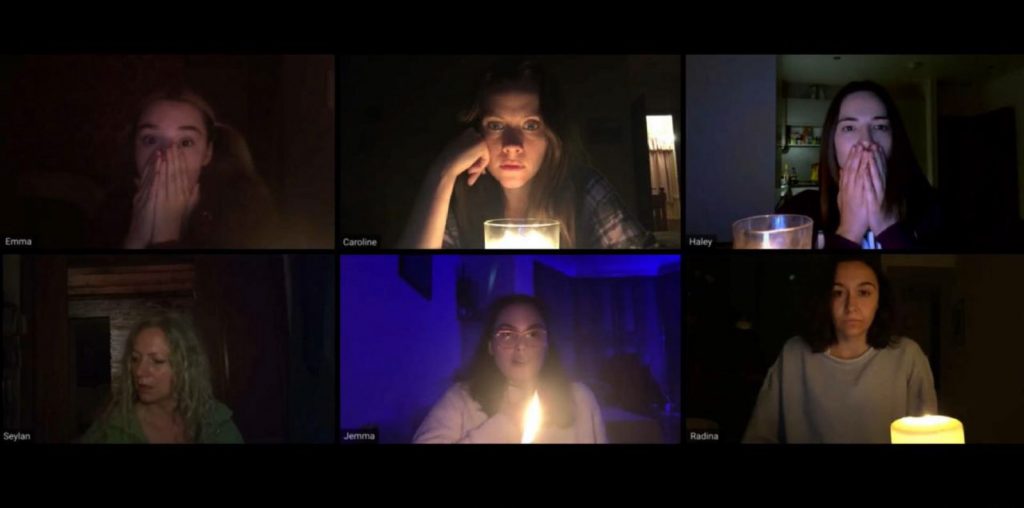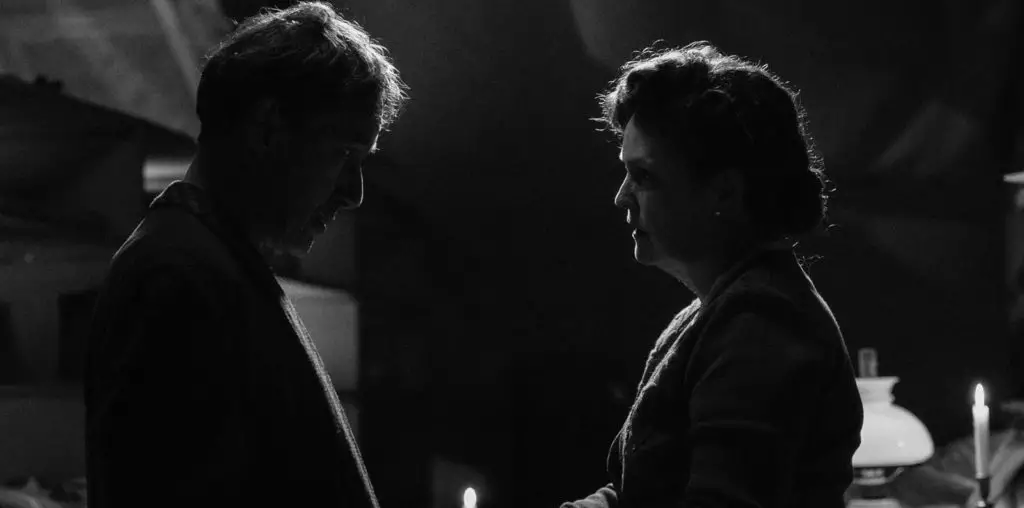
Anyone who’s done any amount of film studies, either on their own or in an educational institution, knows that master filmmaker Alfred Hitchcock was a pretty twisted dude. His portrayal of women as icy cold, his use of characters who are locked up and trapped (either literally or by cinematic shadows) while slowly being torn apart emotionally or physically are all staples of the great directors oeuvre. I didn’t even make mention of the way he makes murder exhilarating with just the right doses of sheer terror and audacity. Or how he seemingly works through his own personal issues on screen, particularly in his later films.
The man is strange, but he’s also a masterful artist, and my point is that all of the aforementioned, mixed with stories culled from his life, all point to a man with a dark sense of humor and a repressed inner life that squirted out onto the screen. While these similarities in his films and sordid tales from the set have been covered nearly ad nauseam in the countless reviews, essays and biographies on the man, of late there’s a newfound interest in what a gross and twisted monster Hitchcock was, particularly as he related to the women he worked with in his films.
HBO’s stab at showing the dark side of Alfred Hitchcock is “The Girl” and it dotes specifically on the relationship between Hitch and the leading lady of “The Birds” and “Marnie,” Tippi Hedren. According to Hedren herself, and somewhat corroborated by those on the scene, Hitchcock put the newbie actress through a living hell while on-set, endlessly approached her sexually and finally destroyed the career he felt he built for her after her repeated spurned advances. And while I remain a major fan of Hitchcock throughout all of his, ahem, shortcomings as a human being, I’ve always felt anyone who paid any attention to the subtext of his films shouldn’t be surprised that Hitchcock was a bit of a creep. But even through knowing all of these dark things my answer to questions of his character has always been: so what? “The Girl” furthers my point-of-view on Hitchcock by missing a great opportunity to make a challenging or even engaging film that throws a spotlight on a misogynistic man seemingly trapped by self-loathing and feelings he cannot control. “The Girl” isn’t bold, insightful or terribly entertaining and that’s a real shame.
“The Girl” stars Sienna Miller in the title role as Hedren, who at the time was a little known fashion model plucked from obscurity by Hitchcock (Toby Jones) and his sidekick wife, Alma Reville (Imelda Staunton). In fact, in “The Girl,” it’s Reville who points out Hedren to Hitchcock in a TV commercial and right from the get-go the film drops a prime opportunity to provide insight into Hitchcock. There is no love at first sight or even a devilish gleam in his eye. Hitchcock merely looks blankly at the TV screen and nods and we cut to Hedren’s first meeting with the director. From here the film again fumbles an opportunity and continues to do so as we never understand the fixation Hitchcock apparently had on Hedren in real-life nor does it come across particularly well in the film. It’s as though screenwriter Gwyneth Hughes and director Julian Jarrold hold no opinion so no point of view comes across on-screen. Without any kind of set-up (rather than those who already know about all of this) there can’t be any payoff and as a result the film just kind of ambles along, almost like a cold biopic of procedural drama.
When I first heard about “The Girl” I was pretty dismayed that Sienna Miller was tabbed to play Hedren. However having seen the film, she’s easily the best part about it overall. While she pretty much looks nothing like Hedren, save her blonde locks, Miller pulls off mannerisms and vocal imitations that are stunningly and thrillingly accurate. I’ve seen “The Birds” at least 20 times (I live 30 minutes from Bodega Bay so it’s required viewing) and Miller’s performance is spot-on and truly fun in the way she pulls off her character.
But on the flipside, I never really cared about the character of Hedren. Just as there’s very little depth added to the character of Hitchcock, there’s equally little added to Hedren which again made me not really care about what was going on. Is Hitchcock horrible to her in the film? Absolutely. Did I like seeing her being broken down physically and mentally? No, not really. But aside from two big, nasty scenes of Hedren abuse, there’s no dramatic arc to the film. Hitchcock advances, Hedren refuses, he does something mean in retaliation, rinse and repeat.
Toby Jones as Hitchcock is o.k. but the way his character is constructed comes across as dull and flat which, for a bigger than life persona, is unacceptable. Yes, he’s morbidly obese and struts around like a privileged king, dispensing filthy, offensive jokes to whoever is within earshot and getting away with his bad behavior because of his reputation. Yet we’re supposed to get that he’s harboring desperate lust and repressed sexual feelings and that really never comes across until later, when the character has to actually tell the audience (via onscreen conversation) his inner feelings. That’s never a good sign. And this sort of annoying exposition happens throughout verbally rather than through the actions onscreen. While wasting a talent like Jones on a seemingly can’t miss part is a bummer, the total misuse of Imelda Staunton as Alma Reville is even more inexcusable.
Perhaps the most intriguing thing about Hitchcock and his dark proclivities was the fact that Reville stood by him and helped hone his films even though she had to be disgusted by what he’d become. Reville stands by her man here but then she’s gone, only to appear later, staring shocked at her husband through thick glasses hiding wet, seemingly stunned eyes and then, she disappears again. The Alma Reville character serves no purpose. There’s no sense of inner strife, no blowup, no… nothing. In yet another opportunity to provide insight to a Hitchcock relationship, “The Girl” chooses poorly and opts to have Reville drive off at dawn’s early light in the midst of a troubled time.
As a person who reads about film and filmmakers endlessly, I’m always open to new interpretations or ideas about those subjects, if they’re done well. “The Girl” was the kind of biopic that is right in my wheelhouse but as the film trudged on, I became more and more tuned out and annoyed at the lack of intrigue. Director Jarrold has some nice touches and homages but the lack of a concrete point-of-view and dramatic arc hurts this film. The set and costume design in “The Girl” are also impeccable and Sienna Miller does an outstanding impression of Hedren but, at the end of the day, these are not nearly enough to breath life into a rather dull look at an intense, strange and controversial situation.

